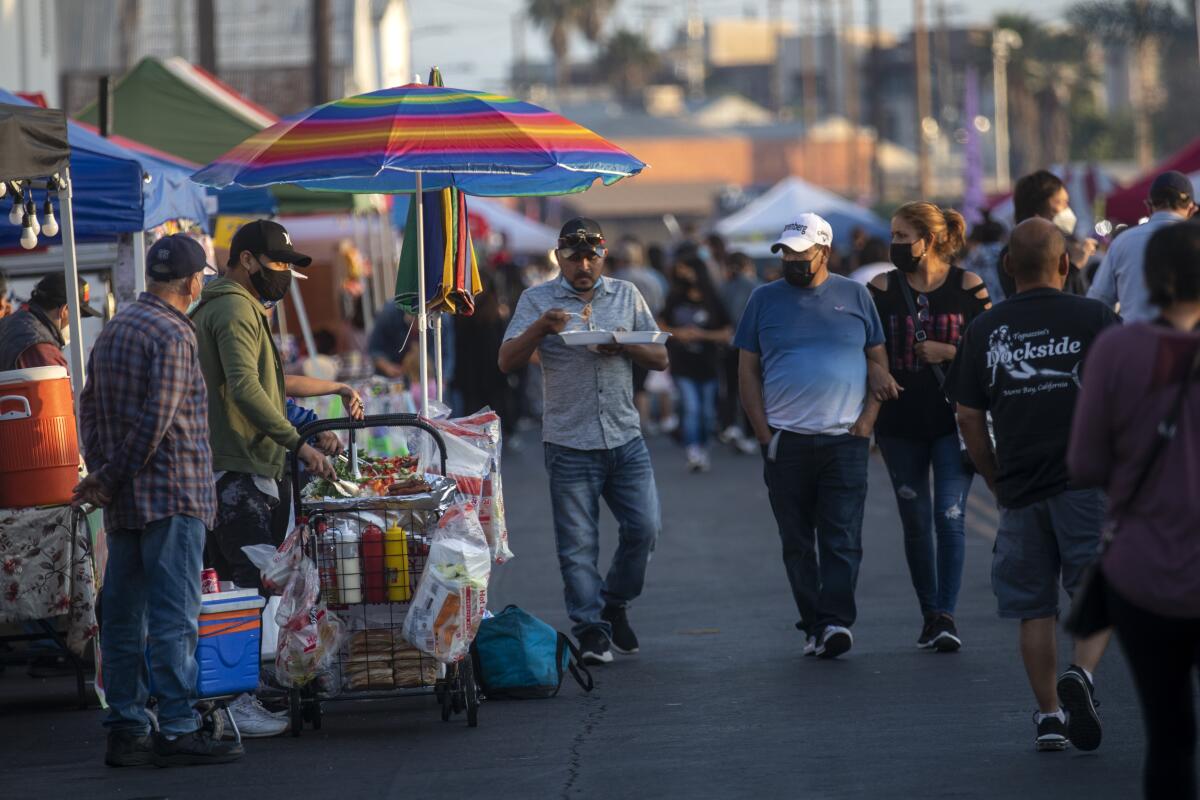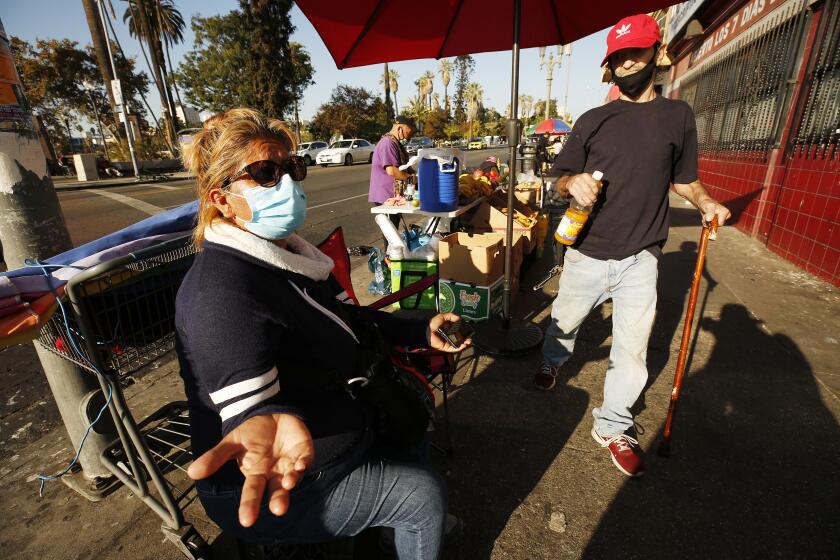Editorial: Legalize street food. L.A.’s iconic sidewalk vendors are still being penalized

Street vending may be legal in California, but for the vendors selling sliced fruit, tacos and other food items it’s nearly impossible to get a permit to operate without fear of penalty, particularly in Los Angeles County.
Why? Because state and county public health regulations for selling food from a street cart remain so complicated, impractical and expensive that the vast majority of vendors have not — and cannot — get permitted. Out of an estimated 10,000 sidewalk food vendors in the city of Los Angeles, fewer than 200 have received permits, according to a report released in August. Most vendors continue to operate outside the law.
In order to legally sell food, a vendor has to get a permit from the Los Angeles County Department of Public Health, which is responsible for interpreting and enforcing the state’s retail food code. To get a permit, the vendor has to have an approved cart. Good luck getting a usable cart approved. The county requires four sink compartments, multiple water tanks for washing cookware and hands, and mechanical exhaust ventilation equipment for many food-prep carts. A code-compliant cart would weigh more than 700 pounds and cost many thousands of dollars, which is just not practical for vendors who earn $15,000 a year, on average. (The county this year signed off on designs for an affordable $7,500 cart that will be a game changer for tamale sellers.)
A state law in 2018 aimed to let these super-small businesses operate under different rules from big food trucks. L.A. officials keep levying fines.
The state code also bars slicing fruit or reheating previously prepared food at the vending cart, making it impossible for two of the most iconic sidewalk sellers — the fruit cart and the taco stand — from becoming licensed, legal operators. And vendors are required to contract with a commissary, which is a commercial facility where mobile sellers prepare their food and store their equipment. But the commissaries in the region are designed and priced to accommodate food trucks and they rarely have the kitchen space that street vendors need.
And that’s the problem. State food-safety laws written for large mobile food sellers apply to street vendors without actually being practical for street vendors. So these mom-and-pop entrepreneurs are left in limbo. Street vending is technically legal but most can’t get the permits to operate legally and so they operate in the shadows, constantly afraid of getting shut down and having their carts confiscated. And while state lawmakers decriminalized street vending, it’s still a criminal misdemeanor to sell food without a permit.
This surely wasn’t what lawmakers intended when Gov. Jerry Brown signed the Safe Sidewalk Vending Act in 2018. The law was supposed to bring street vendors out of the underground economy and into a regulated marketplace where they could become licensed, taxpaying legal businesses. The law barred local governments from adopting blanket bans on street vending and from treating street vending as a crime. Cities could establish street vending regulations and issue citations, but the rules must be based on health and safety rationales.
The video was shocking.
Now state and county officials need to adjust the health and safety codes to fit the realities of street vending. Last month the Board of Supervisors directed the county’s Department of Public Health to look at ways to streamline permitting and help vendors comply with health and safety regulations. The county interprets the state retail food code, and advocates say the health department could adopt more practical interpretations for vendors and still meet the spirit of the law.
Ultimately, however, the state needs to update the retail food code to accommodate sidewalk vending. The county and the Los Angeles City Council have passed resolutions calling on state legislators to introduce bills next year to modernize state law and they’re hopeful changes could be in place for vendors by 2023.
There’s no reason why street-food sellers in California should face significantly more onerous regulations than those in New York City or Portland, Ore. Street tacos, bacon-wrapped hot dogs and elotes are already ubiquitous and beloved in Los Angeles; it’s time to make sure their purveyors can operate in peace and deliciousness.
More to Read
A cure for the common opinion
Get thought-provoking perspectives with our weekly newsletter.
You may occasionally receive promotional content from the Los Angeles Times.











